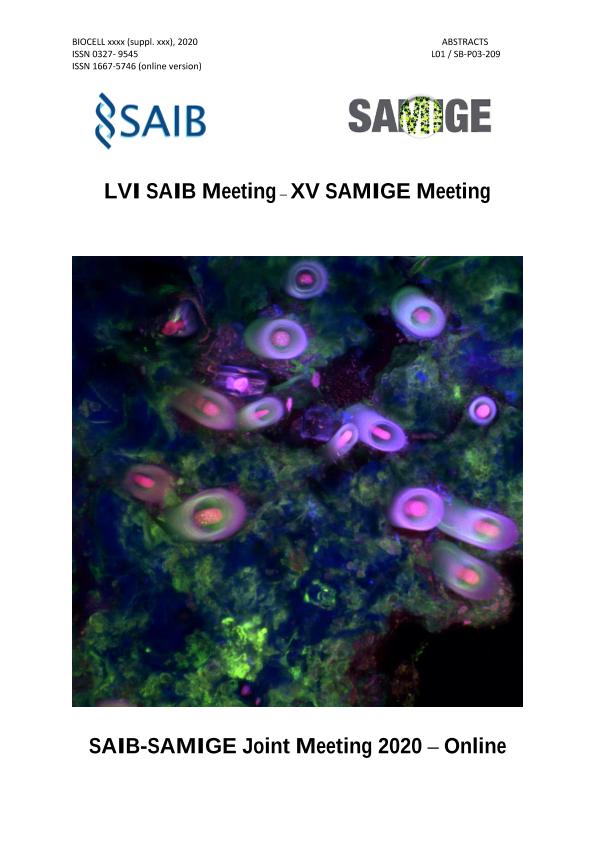Evento
In-depth bioinformatic crispr reconstruction from metagenomic data disclose phage-host evolution in complex environments
Tipo del evento:
Reunión
Nombre del evento:
LVI Annual Meeting Argentine Society for Biochemistry and Molecular Biology; XV Annual Meeting Argentinean Society for General Microbiology
Fecha del evento:
02/11/2020
Institución Organizadora:
Sociedad Argentina de Investigación en Bioquímica y Biología Molecular;
Sociedad Argentina de Microbiología General;
Título de la revista:
Biocell
Editorial:
Tech Science Press
ISSN:
0327-9545
e-ISSN:
1667-5746
Idioma:
Inglés
Clasificación temática:
Resumen
Bacteriophages are highly abundant and ubiquitous in almost any habitat, where they play a critical role in shaping the microbiomes by infecting bacteria and archaea which carry out important processes to the environment. Lab-scale studies revealed that bacterial hosts respond to phage attacks by using a number of mechanisms that allow them to evade phage predation. In turn, genome rearrangements, mutations, and antibacterial defense systems allow phages to overcome these barriers, leading to an evolutionary arms race. However, laboratory settings do not necessarily reflect the more complex interactions that bacteria and phages experience in natural ecosystems. Metagenomics may complement this gap in information, but unfortunately, universal phylogenetic markers, such as the 16S rRNA gene of prokaryotes, are not present in phages. Therefore, investigating the diversity of phage communities and prediction of phage-host relationships is not straightforward. Taking advantage of the CRISPR (clustered regularly interspaced short palindromic repeats) system, which is present in most archaea and nearly 40% of bacteria, we developed a bioinformatic pipeline to provide a comprehensive picture of phage-host coevolution in naturally evolving populations within a complex environment from metagenomic data. The CRISPR-Cas systems are composed by Cas enzymes and an array of short DNA sequences, called spacers, separated by a repetitive sequence. Spacers are incorporated into CRISPR during unsuccessful phage attacks and it acts as an immune system, protecting the cell against future infections of the same phage. At the same time, it keeps a chronological register of previous attacks. In this approach, reads containing repetitive CRISPR sequences from multiple samples were used to reconstruct all the detectable variants of each particular CRISPR array. This resulted in a network of all possible spacers (nodes) connected by repeats (edges), which represent the spatio-temporal universe of CRISPR diversity. This network thus could be used to reconstruct the events of phage infections and identified the rise of new host populations. Phages were matched to their specific bacterial host by searching the corresponding protospacers within the metagenome and their genomes were reconstructed. This methodology was applied to predict phage-Gordonia associations and to assemble bacterial and phage variants in an environmental biotechnology system. By looking closely at single nucleotide variants and resolving CRISPR spacers that were present even at low abundance across a temporal series, we gained insight into the complexity of virus-host interaction at the population level in a real-world setting.
Palabras clave:
CRISPR
,
METAGENOMIC
,
BACTERIOPHAGES
Archivos asociados
Licencia
Identificadores
Colecciones
Eventos(INGEBI)
Eventos de INST.DE INVEST.EN ING.GENETICA Y BIOL.MOLECULAR "DR. HECTOR N TORRES"
Eventos de INST.DE INVEST.EN ING.GENETICA Y BIOL.MOLECULAR "DR. HECTOR N TORRES"
Citación
In-depth bioinformatic crispr reconstruction from metagenomic data disclose phage-host evolution in complex environments; LVI Annual Meeting Argentine Society for Biochemistry and Molecular Biology; XV Annual Meeting Argentinean Society for General Microbiology; Ciudad Autónoma de Buenos Aires; Argentina; 2020; 1-2
Compartir




